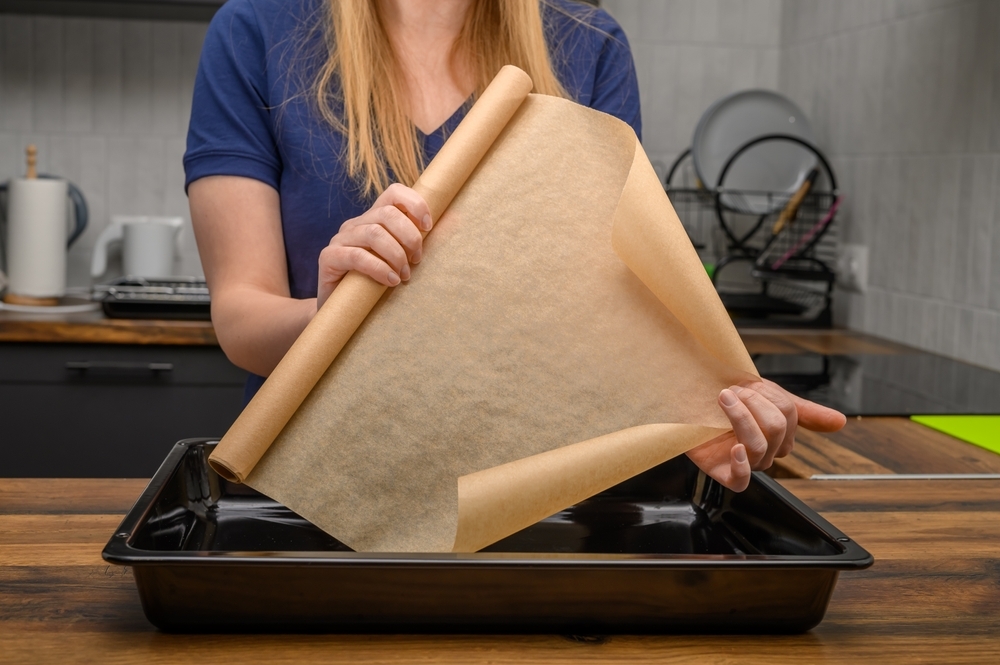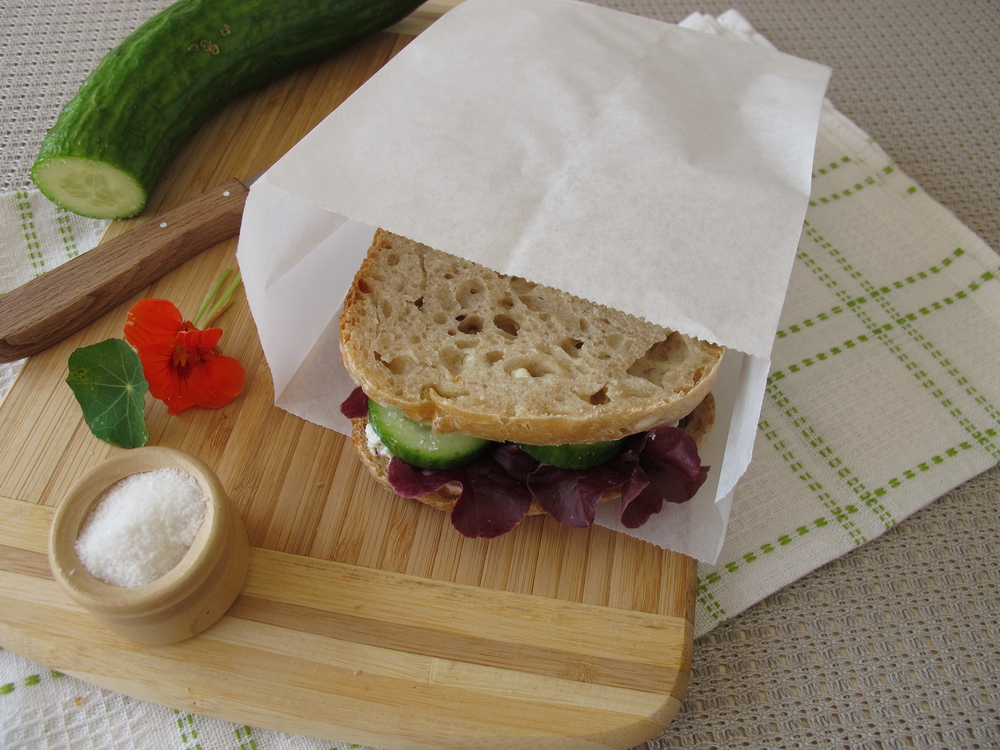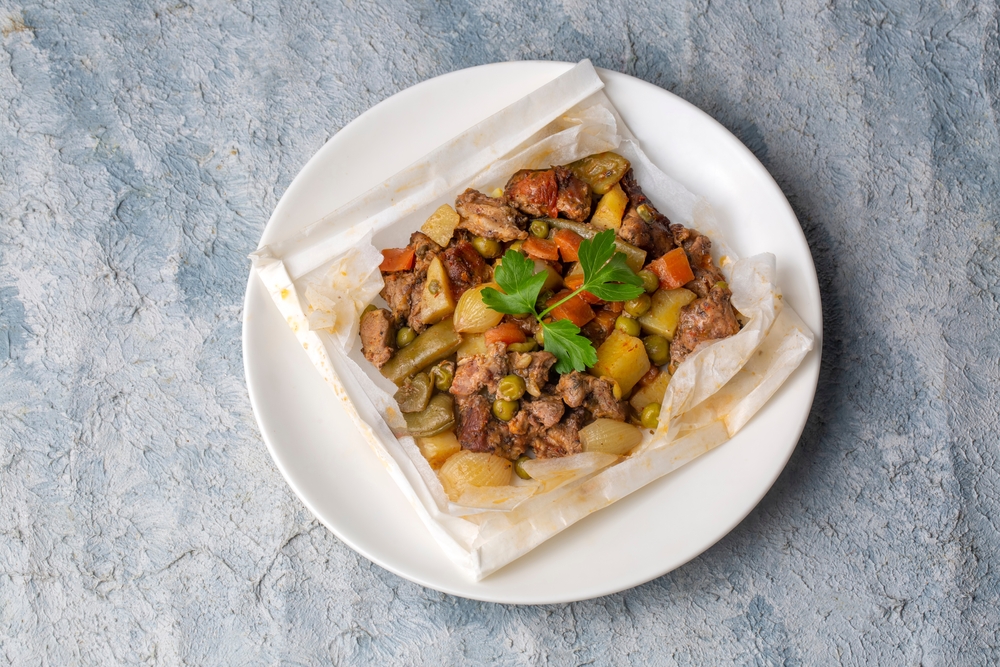Greaseproof Paper As A Sustainable Substitute for Single-Use Plastics
By Alysse Phily · 3. July 2024
Greaseproof paper is emerging as a sustainable greaseproof paper alternative to single use plastic. It’s compostable, biodegradable, and free from harmful chemicals, making it safe for all your cooking and food storage needs.
This article explores how greaseproof paper works, its environmental benefits, and its advantages over other materials.
Learn how switching to greaseproof paper can significantly reduce plastic waste in your daily life. 🌍
Key Takeaways
- Greaseproof paper, made from tightly bonded paper pulp fibres, functions as a versatile, heat-resistant, and eco-friendly alternative to single-use plastics in various culinary applications.
- Single-use plastics pose significant environmental and health risks, including pollution, microplastic contamination, and intensive fossil fuel consumption, highlighting the need for sustainable alternatives like greaseproof paper.
- Greaseproof paper offers several environmental benefits over other materials like aluminium foil and waxed paper, being compostable, biodegradable, and devoid of harmful additives, making it a preferred choice for reducing plastic waste.
Understanding Greaseproof Paper
 woman holds roll of brown baking paper
woman holds roll of brown baking paper
Greaseproof paper is crafted from tightly bonded paper pulp fibres, resulting in a dense, oil-resistant material that does not require additional chemical treatments.
This natural oil and grease resistance makes it a crucial tool in many culinary applications, from lining cake tins to wrapping sandwiches. Its ability to withstand heat without sticking is particularly valuable in baking and roasting.
Unlike regular paper, greaseproof papers are safe to use in the freezer, oven, and microwave, adding to their versatility. They can even be used in a frying pan to cook fish in a non-stick manner, showcasing their adaptability.
However, distinguishing between greaseproof paper and baking paper is necessary. While both serve similar purposes, baking paper is coated with silicone, enabling it to endure higher temperatures.
Consequently, greaseproof paper is more than just a common kitchen item; it’s a sustainable choice that aligns with our environmental objectives.
Its natural composition and multifunctionality make greaseproof paper an alternative to single-use plastic products found in our kitchens.
Environmental Impact of Single Use Plastics
Single-use plastics, including plastic bags, have become ubiquitous in our daily lives, but their environmental impact is staggering.
Only about 14% of plastic packaging is collected for recycling globally, leading to a significant amount of plastic waste.
This waste not only clogs our landfills but also pollutes our landscapes, roadways, and public spaces.
The Great Pacific Garbage Patch, containing over 87,000 tonnes of plastic debris, is a stark reminder of the scale of this problem. 🗑️
The impact of plastic waste extends beyond visible pollution. Microplastics have infiltrated our food, water, and even the air we breathe, posing serious health risks. These tiny particles have been found in human bodies, where they can cross into foetal circulation.
Wildlife is also severely affected, with over 260 species impacted by ingesting or becoming entangled in plastic waste.
Moreover, the production and transportation of plastics have several negative environmental impacts:
- They are energy-intensive, consuming 6% of global oil resources and contributing to greenhouse gas emissions.
- The extraction of fossil fuels for plastic production has a significant environmental footprint.
- Plastic waste takes a long time to degrade in the environment, leading to long-term pollution.
- Hazardous chemicals leached from plastic waste can contaminate soil and groundwater, posing risks to ecosystems and human health.
Considering these severe environmental and health problems, it is indispensable to reduce our reliance on single-use plastics.
Embracing sustainable alternatives like greaseproof paper can significantly mitigate the detrimental impacts of plastic pollution.
Why Consider Greaseproof Paper as an Alternative?
 cucumber and sandwich in greaseproof paper bag
cucumber and sandwich in greaseproof paper bag
Greaseproof paper stands out as a sustainable alternative to single-use plastics for several reasons:
- It is compostable and biodegradable.
- Many greaseproof papers are made from 100% virgin cellulose paper pulp, which is free from non-recyclable compounds.
- It can be commercially or home composted.
- Under the right conditions, compostable greaseproof paper can degrade in three to six months.
These qualities make greaseproof paper an eco-friendly option.
Utilising greaseproof paper offers several benefits:
- Minimises single-use plastic waste, aligning with the concept of zero waste ♻️
- Non-stick surface makes it suitable for baking and roasting
- Heat-resistant properties allow for wrapping and storing food
- Can replace plastic wraps, reducing our environmental footprint without compromising functionality
Incorporation of greaseproof paper into our everyday practices signifies a considerable move towards sustainability.
It provides an eco-friendly solution that meets our needs while addressing the urgent issue of plastic pollution.
Comparing Greaseproof Paper with Other Alternatives
When assessing alternatives to single-use plastics, it’s vital to take into account the characteristics and environmental effects of various materials.
Greaseproof paper, aluminium foil, and waxed paper each have unique attributes that make them suitable for various applications. Understanding these differences can help us make informed decisions that benefit both our lifestyle and the planet.
Greaseproof Paper vs Aluminium Foil
Aluminium foil is a popular choice for high-heat cooking like grilling, but its environmental footprint is significant. While aluminium foil is recyclable, it must be clean and free from food residues to be processed correctly.
Contaminated foil can disrupt the recycling process, making it unsuitable for recycling. Additionally, the health implications associated with aluminium use can be concerning, further challenging its practicality.
In contrast, greaseproof paper is compostable and biodegradable, offering a more environmentally friendly option. It can be used for various cooking and baking applications without the same health risks associated with aluminium.
While both materials have their uses, greaseproof paper’s sustainability makes it a preferable choice for eco-conscious consumers.
Greaseproof Paper vs Waxed Paper
Waxed paper, with its moisture-resistant properties, is often used for wrapping and lining dishes. However, its synthetic additives, derived from petroleum, make it non-recyclable and unsuitable for composting.
The wax coating prevents the fibres from breaking down in the recycling process, contributing to landfill waste.
Greaseproof paper, on the other hand, can be recycled and composted, aligning with sustainable waste management practices. Its heat-resistant and non-stick surface makes it ideal for cooking, baking, and food packaging.
Therefore, greaseproof paper not only serves similar functions as waxed paper but also offers significant environmental benefits.
How to Properly Dispose of Greaseproof Paper
Correct disposal of greaseproof paper is vital for preserving its environmental advantages. Most greaseproof papers cannot be recycled due to their silicone coating and oil-repellent properties.
Therefore, greaseproof paper that has come into contact with greasy or oily food should be placed in general waste to avoid contaminating other recyclable materials.
For effective waste management, it’s imperative to dispose of used greaseproof paper in the right manner. By doing so, we can prevent contamination in recycling bins and support more sustainable waste disposal practices.
Practical Tips for Reducing Single Use Plastic with Greaseproof Paper
 traditional turkish food wrapped in greaseproof paper
traditional turkish food wrapped in greaseproof paper
Integrating greaseproof paper into your daily practices can remarkably cut down on single-use plastic waste. For instance, using greaseproof paper instead of plastic wrap to cover food in the microwave can prevent splatters and reduce plastic usage.
Similarly, wrapping a block of cheese in greaseproof paper allows it to breathe and stay fresh without the need for plastic packaging.
Greaseproof paper is also useful in cooking and food preparation. Placing it on a panini press can help achieve grill marks without the mess.
Additionally, using it to wrap individual butter portions or serve oily foods like chips and onion rings can reduce the need for plastic containers.
Apart from greaseproof paper, there are other environmentally friendly practices to consider. Glass jars and containers can replace plastic ones for storing food and buying bulk items.
Silicone baking mats can be used instead of disposable parchment paper for baking and roasting, further minimising waste.
Innovations in Eco-Friendly Paper Products
The invention of environmentally friendly paper products reflects human ingenuity in tackling plastic pollution.
Natural fibres like bamboo and cotton are biodegradable and non-toxic, offering sustainable packaging options.
Biopolymers such as Polylactic Acid (PLA), derived from biomass, are compostable and environmentally friendly.
Seaweed-derived packaging is another innovative solution, biodegrading quickly and possessing antioxidant and antimicrobial properties that extend food shelf life.
Additionally, custom printed greaseproof paper can be made from natural materials, providing an eco-friendly option for wrapping foods like fries, burgers, and sandwiches.
These advancements underscore the potential of sustainable substitutes, such as plastic bottles and single-use plastic straws, to supplant single-use plastics, thereby contributing to a healthier planet and aligning with the goals of the United Nations Environment Assembly.
Additional Alternatives to Single Use Plastics
Apart from greaseproof paper, many other substitutes can assist in reducing single-use plastic waste.
Beeswax wraps are an excellent substitute for plastic wrap, being reusable for about a year. Glass jars and containers are durable and can replace plastic storage options, reducing plastic usage.
Wooden kitchen tools, such as spoons and brushes, are biodegradable and serve as good alternatives to plastic cutlery.
Reusable plant-cellulose dishcloths can replace disposable ones and are compostable, aligning with zero-waste principles.
Reusable packaging systems, where customers bring their own containers to refill, can significantly cut down on single-use plastic waste.
These alternatives not only minimise plastic waste but also foster a more sustainable way of life.
Summary
In summary, greaseproof paper offers a sustainable alternative to single-use plastics, thanks to its compostability and biodegradability.
By understanding its benefits and how to use it effectively, we can make more eco-friendly choices in our daily lives.
Embracing innovations in eco-friendly paper products and exploring additional alternatives can further reduce our plastic footprint.
Let’s take these steps towards a greener future. 🌱
Frequently Asked Questions
Is greaseproof paper the same as baking paper?
No, greaseproof paper and baking paper are not the same. Baking paper is coated with silicone and can handle higher temperatures, while greaseproof paper is naturally resistant to oil without chemical treatments.
Can greaseproof paper be composted?
Yes, greaseproof papers made from 100% virgin cellulose paper pulp are compostable and biodegradable.
Why can’t waxed paper be recycled?
Waxed paper cannot be recycled because it contains synthetic additives derived from petroleum and a wax coating, which makes it unsuitable for recycling and composting.
How does greaseproof paper help reduce single-use plastic waste?
Greaseproof paper can be a sustainable alternative to plastic wraps and containers, helping to reduce single-use plastic waste in various culinary applications.
What are some other eco-friendly alternatives to single-use plastics?
You can consider using beeswax wraps, glass containers, wooden kitchen tools, and reusable packaging systems as eco-friendly alternatives to single-use plastics. These options can help reduce plastic waste and promote a more sustainable lifestyle.

